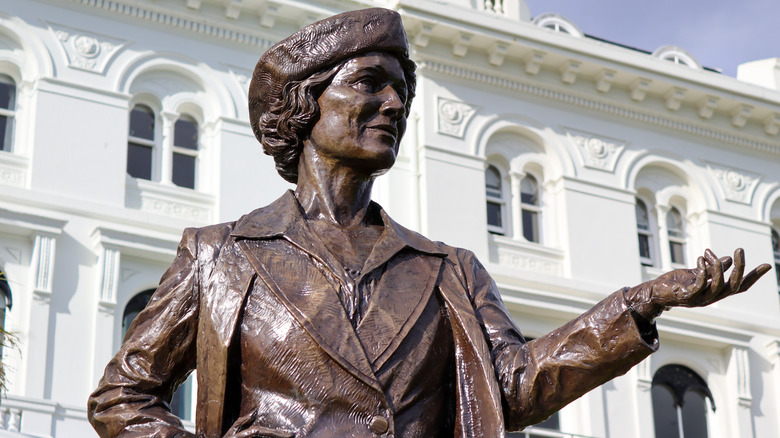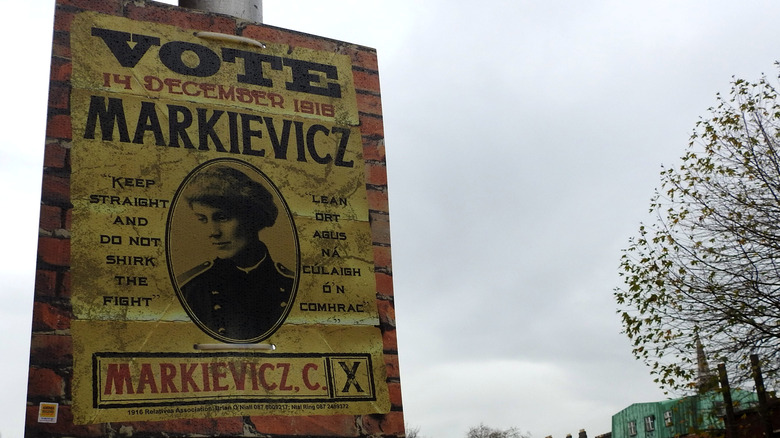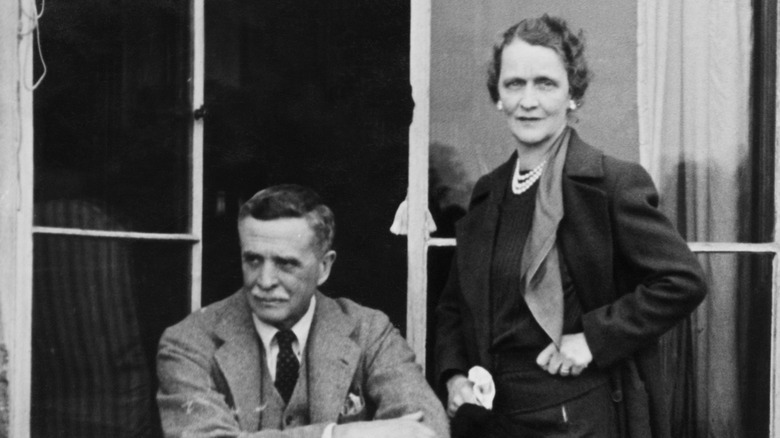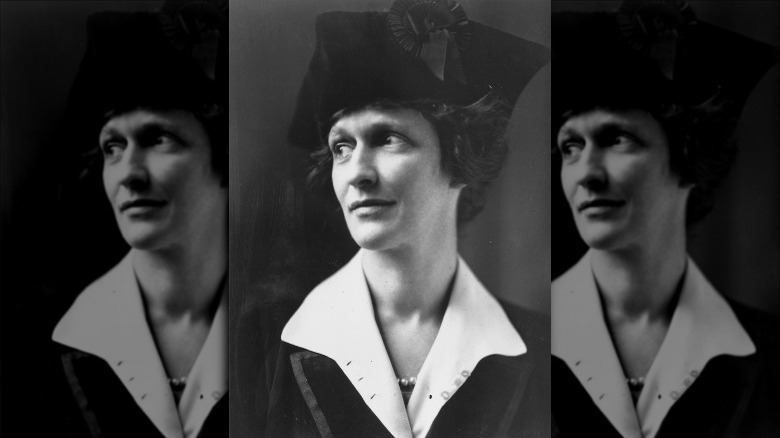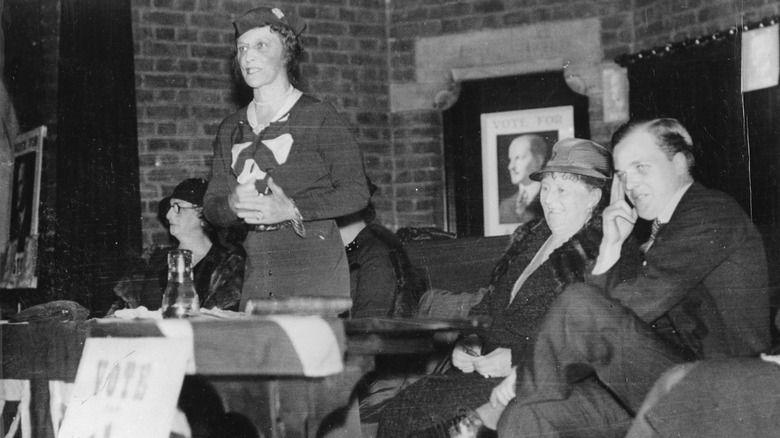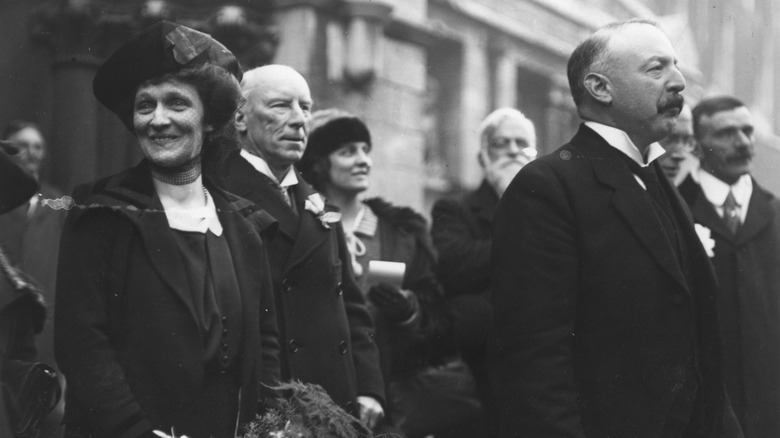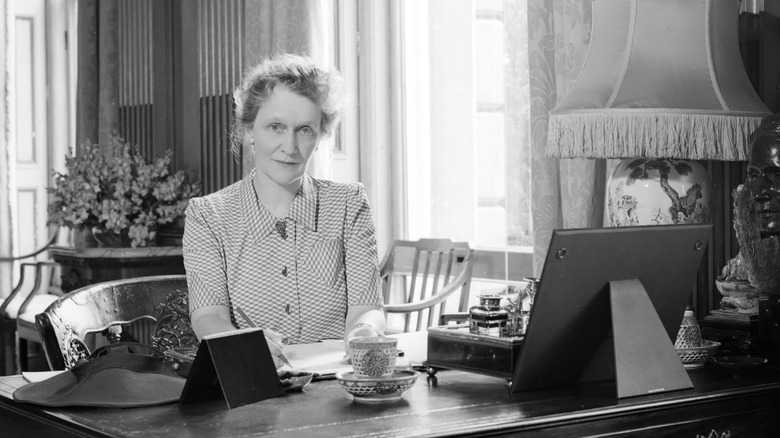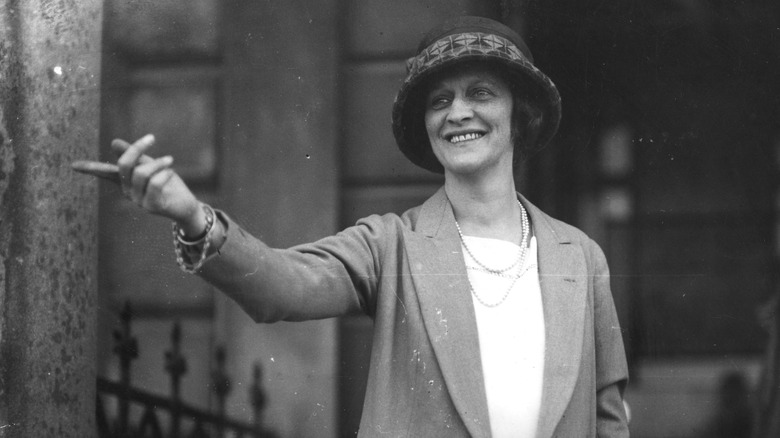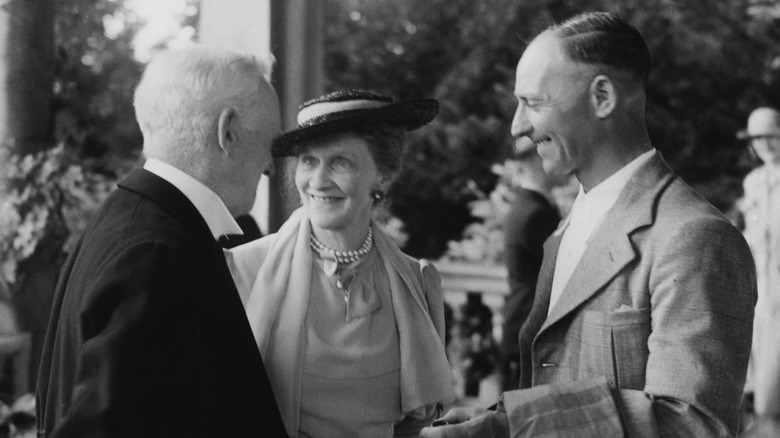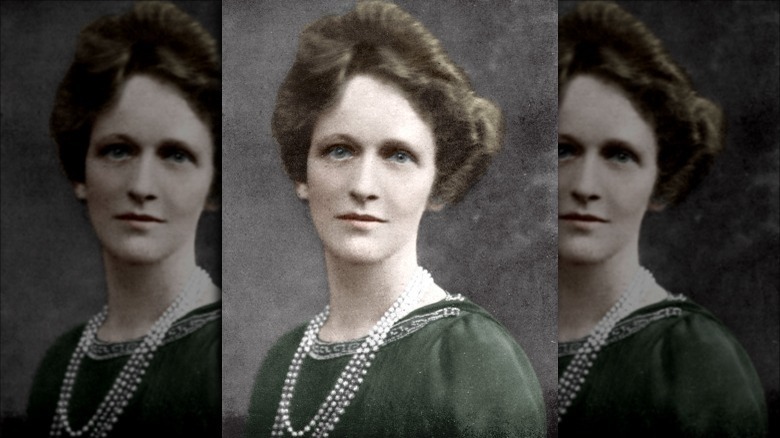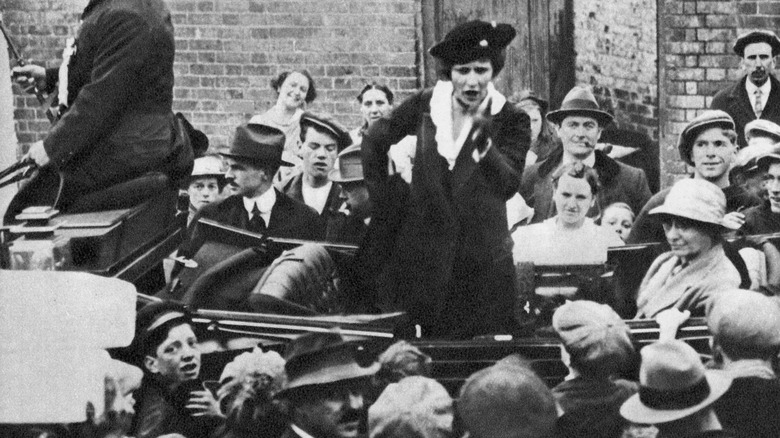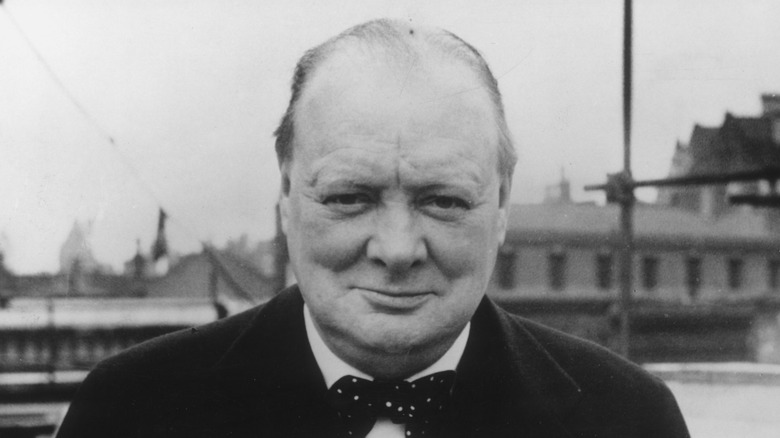The Crazy True Story Of Nancy Astor, The First Woman In The UK Parliament
The history of equal rights around the globe is filled with vibrant, brave personalities who risked everything in order to secure the rights and privileges that many of us enjoy today. The push for women's suffrage is one example. For decades, women fought and struggled in order to acquire the most fundamental right in any free and democratic society — the right to vote. Once that was accomplished, for many, the next step was obvious: women being elected to office.
This context is why Nancy Astor's 1919 election to the U.K Parliament was so important. As the first woman to be seated as an M.P. (just a year after the U.K. gave women over 30 the vote), Astor's place in history is assured.
But Nancy Astor wasn't your typical political heroine, or your typical woman. Just about every aspect of her life runs against what you might expect when you hear about the first woman in Parliament. Colorful, opinionated, and able to hold her own with heavyweight political figures ranging from Winston Churchill to Joseph Stalin, but also racist and politically uninformed, here's the crazy true story of Nancy Astor, the first woman in the U.K. Parliament.
Nancy Astor wasn't the first woman elected to Parliament
If you search Nancy Astor's name, you might see her referred to as the first woman to be elected to Parliament. But that's not true at all. She's the first woman to be seated as a Member of Parliament (M.P.), but she was actually the second woman to be elected.
As explained by New Statesman, the first woman actually elected to Parliament in the U.K. was Countess Constance Markievicz, who took the Westminster seat in 1918. That was the first year that women were legally allowed to run for office in the U.K., and 17 women took the opportunity, with only Markievicz making the cut. But Markievicz won her election while languishing in a jail cell, and never actually took her seat.
Britannica explains that Markievicz was a long-time activist for Irish nationalism. She ran for Parliament as a member of Sinn Féin, often described as the political wing of the Irish Republican Army, and participated in the 1916 Easter Rising — a failed insurrection against British rule in Ireland. She was arrested for her involvement, then released, but was arrested again for plotting more revolution. When she was elected, like all members of Sinn Féin she refused to swear an oath of loyalty to the king, and so never actually took her seat in Parliament. That allowed Nancy Astor to have the distinction of being the first woman to sit in Parliament.
Nancy Astor married rich — twice
Remarkably, the first woman to sit in the U.K. Parliament wasn't actually British. As reported by the Crown Chronicles, Nancy Astor was born Nancy Witcher Langhorne in Danville, Virginia in 1879. The Langhornes were rich, but Nancy's father had a habit of losing and then re-making fortunes. In 1897, when she was just 18 years old, Nancy's married Robert Gould Shaw II, who was himself immensely wealthy. Her life of ease and privilege seemed assured.
The marriage was a disaster from the very beginning. Nancy left Gould on their honeymoon — the first of several attempts to leave him over the course of their six-year marriage. She accused Shaw of being an abusive alcoholic, and finally secured a divorce from him in 1903, a remarkable achievement at a time when divorce was rare and scandalous.
According to the Los Angeles Times, Astor moved to England shortly after. She fell in love with and married another fabulously rich man — Waldorf Astor, a fellow American. Waldorf's father had moved to England and he had been raised as an English gentleman, but he'd been born in New York. Waldorf was interested in politics and won a seat in Parliament for the constituency of Plymouth in 1910, according to History. But when his father, the Viscount Astor, passed away, Waldorf assumed his father's title and was forced to give up his seat in the House of Commons and move to the House of Lords. Nancy ran for the vacant seat, and won.
Nancy Astor wasn't much of an activist
You might assume that the first woman to sit in Parliament was a firebrand activist who'd been fighting for equal rights her whole life. And you would be very, very wrong.
As explained by the New York Times, Astor was an unexpected choice to be the first woman in Parliament. Instead of coming from the ranks of suffragists, she instead came from a background of wealth and privilege, and had displayed zero interest in politics or women's rights prior to her election. In fact, when her husband was forced to give up his seat in Parliament when he became Viscount Astor, it was his efforts to get around the law banning lords from serving in the House of Commons that led him to suggest she run for his seat.
History Matters explains that Astor is widely considered a feminist and suffragist by "default rather than by design." She'd taken exactly zero interest in women's fight for the vote or the right to hold office, and entered the 1919 by-election solely at her husband's urging in order to keep the Plymouth seat in the family any suffragists initially regarded her with clear suspicion. Despite this lack of activism, Astor's ascension remains a monumental moment for women's rights.
Nancy Astor didn't know the issues
As Time reports, Nancy Astor campaigned for her seat in 1919 almost as if she didn't really want the job. She mocked her constituents for being poor, for one thing, and, as noted by New Statesman, her campaign could be seen as a machination by the conservative party as a way of holding onto a seat in Parliament, as well as a way to symbolically support the suffrage movement. According to Spartacus Educational, she was regarded as "lamentably ignorant" of the issues of the time by suffragists.
But what everyone agrees on is that Nancy Astor was charming. She was clever and quick, and she insulted just as many rich people — usually getting a laugh when she did so. Even her husband wasn't safe from her sharp wit — she once famously said "I married beneath me. All women do." The more people pointed out her ignorance or privilege, the better. Author John Grigg quotes Oswald Mosley, who campaigned for Astor, as saying "She was absolutely unabashed by any situation. Great effrontery but also, of course, enormous charm. People were usually overcome by it. She was much better when she was interrupted. She must have prayed for hecklers and interrupters."
Nancy Astor faced serious chauvinism
As the first woman to be seated in Parliament in 1919, you might hope Nancy Astor was greeted enthusiastically by peers who were happy to see antiquated concepts of gender roles swept away. Of course, that's not what happened. Instead, Astor spent much of her political career jousting with chauvinists and misogynists.
According to Time, Astor was treated rudely from the very beginning. Winston Churchill famously refused to speak to her for years. F Yeah History reports that traditionally an M.P.'s first speech in Parliament — known as their maiden speech — is allowed to be made without the usual interruptions and jeers from the opposition, but this tradition wasn't followed for Astor's maiden speech. The History Press describes Astor's audience in the House of Commons that day as "hostile." The attempts to shout her down prompted Astor to remind the hundreds of men opposing her that women now had the vote, and that they would continue to use it.
Time also reports that Astor slowly won over her male peers, but that she still had to contend with horrifying sexism in the form of threatening letters and other forms of anonymous abuse that would be familiar to any woman on social media today. Part of her legacy is the way she endured these attacks and nevertheless persisted.
Nancy Astor didn't accomplish much
Nancy Astor was an M.P. for 25 years, winning seven elections in that time. But she didn't have much to show for her decades in Parliament.
On the one hand, Nancy Astor lent her name and verbal support to several progressive policies. History Extra points out that she publicly supported women's rights, prison reform, and welfare reform. She also supported changing the legal voting age for women, which was initially set at age 30, but when the legal voting age for women was finally changed to 21 in 1928, Astor wasn't a big part of it. According to Time, she didn't do much actual legislative work towards her goals, and isn't regarded as a particularly influential M.P.
The one piece of legislation that she can lay claim to was a bit of a passion project — the law officially called The Intoxicating Liquor (Sale to Persons under Eighteen) Act, known casually as Lady Astor's Bill. The law raised the drinking age in England from 14 to 18. While the bill is notable for being the first private member's bill introduced by a woman to be voted into law, it's not exactly history-making legislation. Astor's Parliamentary legacy as the first female member is unassailable, but as a politician she's remembered more for her sharp wit and insults than her legislative achievements.
Nancy Astor was pretty racist
As the first woman to be seated as an M.P, Nancy Astor's legacy should be assured regardless of her legislative record. Unfortunately, that legacy is tarnished somewhat by some of her beliefs. She was virulently racist, anti-Semitic, and anti-Catholic, with a healthy dose of Nazi sympathy. That's the sort of thing that gets statues dedicated in your honor vandalized.
Being an anti-Semite wasn't out of step with much of the world when Astor was initially elected back in 1919, but, as Vice notes, by the time Hitler and the Nazis showed up, Astor's worldview became increasingly horrifying. She even suggested that National Socialism might be a remedy to the "world problem" of the Jews. According to the New York Times, she also regularly hosted a group of influential people dedicated to appeasing the Nazis prior to the war, dubbed the Cliveden set after the house she and her husband owned. In fact, Astor's sympathy towards Nazi Germany in the years before World War II was so notable that she was referred to as "the Member for Berlin" by a fellow M.P.
Astor was also known to dislike Catholics, and asserted that they were "subverting" the U.K.'s foreign office during World War II, according to the History Press. She is also reported to have pushed her husband to avoid hiring Jewish and Catholic people at his businesses.
Nancy Astor was pushed out of politics and bitter about it
After becoming the first woman to sit in the House of Commons, Nancy Astor served her constituency for 25 years. She won seven elections during that time, but by the time World War II rolled around, her apparent sympathy for the Nazis, anti-Semitism, and increasing lack of coherency made her seem like more and more of a liability to her party. As reported by the New York Times, her speeches became longer and less focused, prompting one colleague to say that debating her was "like playing squash with a dish of scrambled eggs."
So, after 25 years and seven elections, Astor was convinced to step down and not try to run for an eighth term as the Member of Parliament for Plymouth. The History Press reports that she gave in, unwillingly, to a combination of pressure from the Conservative Party, which thought she'd become so unpopular she might lose the seat, and her own husband, who told her point blank he did not support her running again. The rest of her family took her husband's side, and it caused a serious rift between her and her loved ones that lasted the rest of her life.
In fact, Astor's marriage suffered as a direct result. Shortly after her retirement, she and Waldorf Astor began living apart, and they remained unofficially separated until shortly before his death in 1952.
Nancy Astor was a devout Christian Scientist
Nancy Astor was a very spiritual person who took her faith in God very seriously. UK Christian Science reports that she was raised as an Episcopalian, and that she was always very devout. She read the Bible and dedicated much of her time and energy towards trying to do good in God's name.
According to Vanity Fair, in 1914 Astor became seriously ill and had to undergo an operation that left her in pain and miserable. During her recovery, she discovered the teachings of the Christian Scientists, who believe that God never intends anyone to be sick or in pain, and that prayer can cure any physical ailment. Astor converted, and later claimed that she was never once sick for the rest of her life once she had accepted Christian Science teachings.
While Astor's faith obviously sustained and energized her, it also caused her problems. Like many converts, Astor was overly enthusiastic and was constantly trying to convert those around her — often alienating people in the process. One example is given by author Robin Brown, who notes that famed writer Hilaire Belloc stopped visiting because Astor continuously tried to convert his daughters to her religious beliefs.
Nancy Astor was virulently anti-alcohol
Generally speaking, voters want politicians to honestly pursue their convictions, even if it comes at a political cost. In practice, most politicians think a bit more about the coming election and adjust their stances to court the favor of their constituents. To her credit, Nancy Astor was more of the former, especially when it came to her favorite subject: alcohol.
The Daily Beast reports that Astor came by her hatred of alcohol honestly: her father, brothers, and first husband were all heavy drinkers. She blamed their problems and her strained relationships with them on liquor. She was so passionately opposed to alcohol, in fact, that the BBC reports her first speech in Parliament — typically an uncontroversial moment where the newly-elected M.P. takes a victory lap — was centered on the need to eliminate alcohol for the betterment of everyone. And, as History Extra explains, the one piece of major legislation put forth by Astor was a bill raising the legal drinking age to 18 years.
Astor's anti-alcohol stance wasn't popular, though, and combined with her erratic, rambling speeches and lack of legislative achievement, it began to erode her personal popularity. The History Press reports that in 1930, for example, Astor made a speech asserting that the British had lost a recent cricket match because of alcohol, which caused an uproar and showed her to be out of step with the rest of the country.
Nancy Astor confronted Joseph Stalin
Nancy Astor was staunchly anti-communist. In fact, while she saw very little threat from the Nazis prior to World War II, she saw nothing but threats from communism, and saw it as a negative force that must be opposed, according to author Adrian Fort in "Nancy: The Story of Lady Astor."
So the decision by her friend, the famous playwright George Bernard Shaw, to invite her to accompany him to Moscow in 1931 was a strange one. As noted by Adrian Fort, the two were genuinely friends, and Shaw felt he needed support as he toured a country that seemed to have no artistic appreciation for him. Astor's son, David, was an admirer of the communist regime in Russia, which some thought implied that Astor wasn't as anti-communist as it seemed.
Those doubts were dispelled, however, when Astor was granted a face-to-face meeting with the Soviet dictator Joseph Stalin. Time reports that Astor didn't play it safe with this rare opportunity. Without blinking an eye, she asked him point-blank when he planned to stop killing his own people by the millions. Stalin responded with bone-chilling honesty, saying "When it is no longer necessary. Soon, I hope."
Nancy Astor had a battle of wits with Churchill — and won
Winston Churchill was not only a brilliant politician and the man credited with pulling his country back from the brink of collapse during World War II. He was also renowned for his way with words. This is the man who coined the term "Iron Curtain" and who made the famous "Fight them on the Beaches" speech, after all.
But while Nancy Astor was far from Churchill's equal in politics, she was equal to him in the other respect. Sharp-tongued and quick-witted, she was well-known in Parliament for her zippy insults and ability to stand up to male bullies. Her relationship with Churchill has become the stuff of legend because of the long-term battle of wits the two engaged in over the course of years. War History Online reports that one of their most famous exchanges was won by Churchill when Astor snapped "If I were your wife, I'd poison your tea!" and the Prime Minister responded "If I were your husband, I would gladly drink it!"
But Astor won as many of these exchanges as she lost. As reported by the Casual Observer, when Churchill grumbled that having a woman in the House of Commons was like having a lady walk in on him in the bathroom, Astor shouted "You're not handsome enough to have such fears!" When Churchill wondered about what disguise to wear to a masquerade party, Astor reportedly suggested "Why don't you come sober?"
